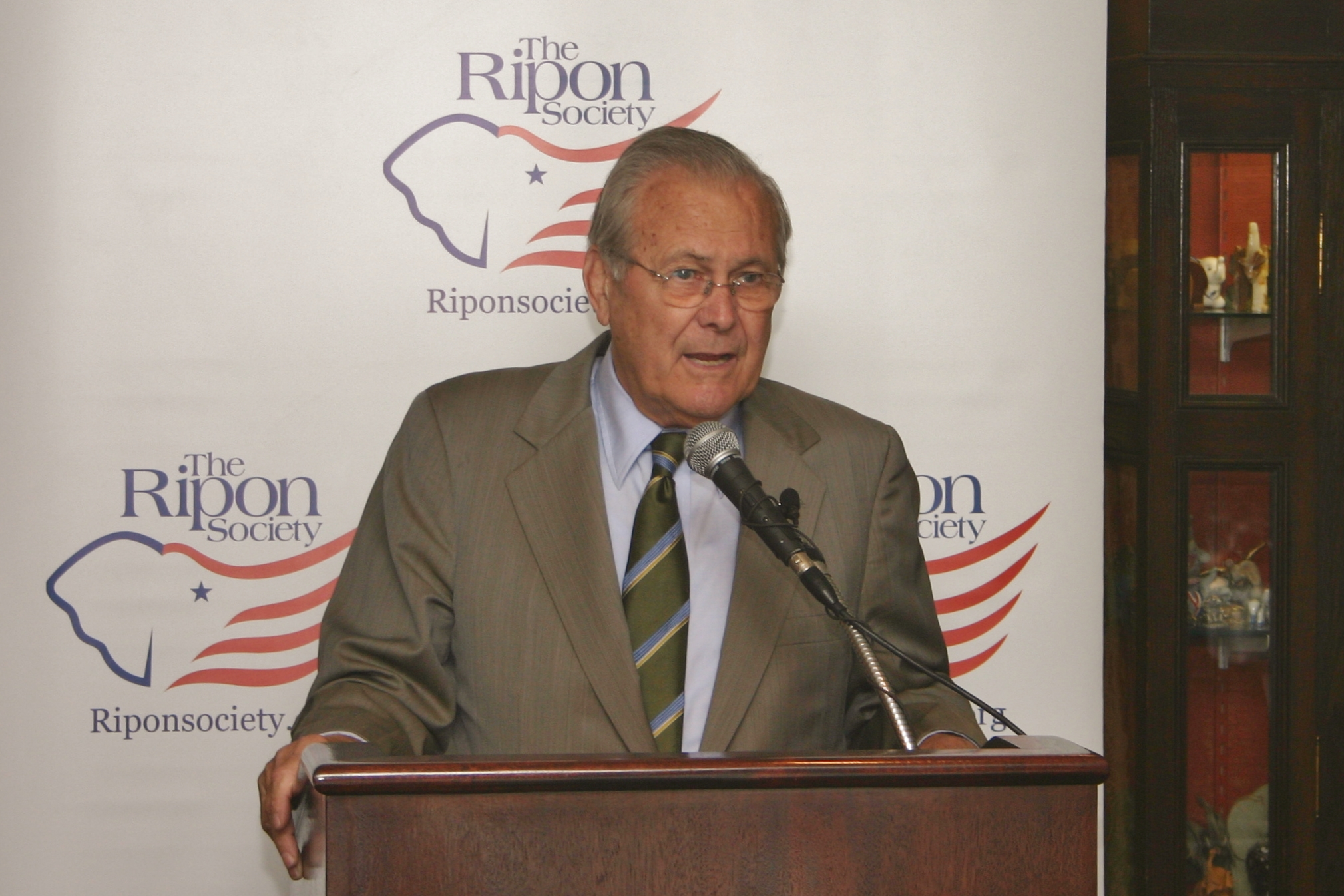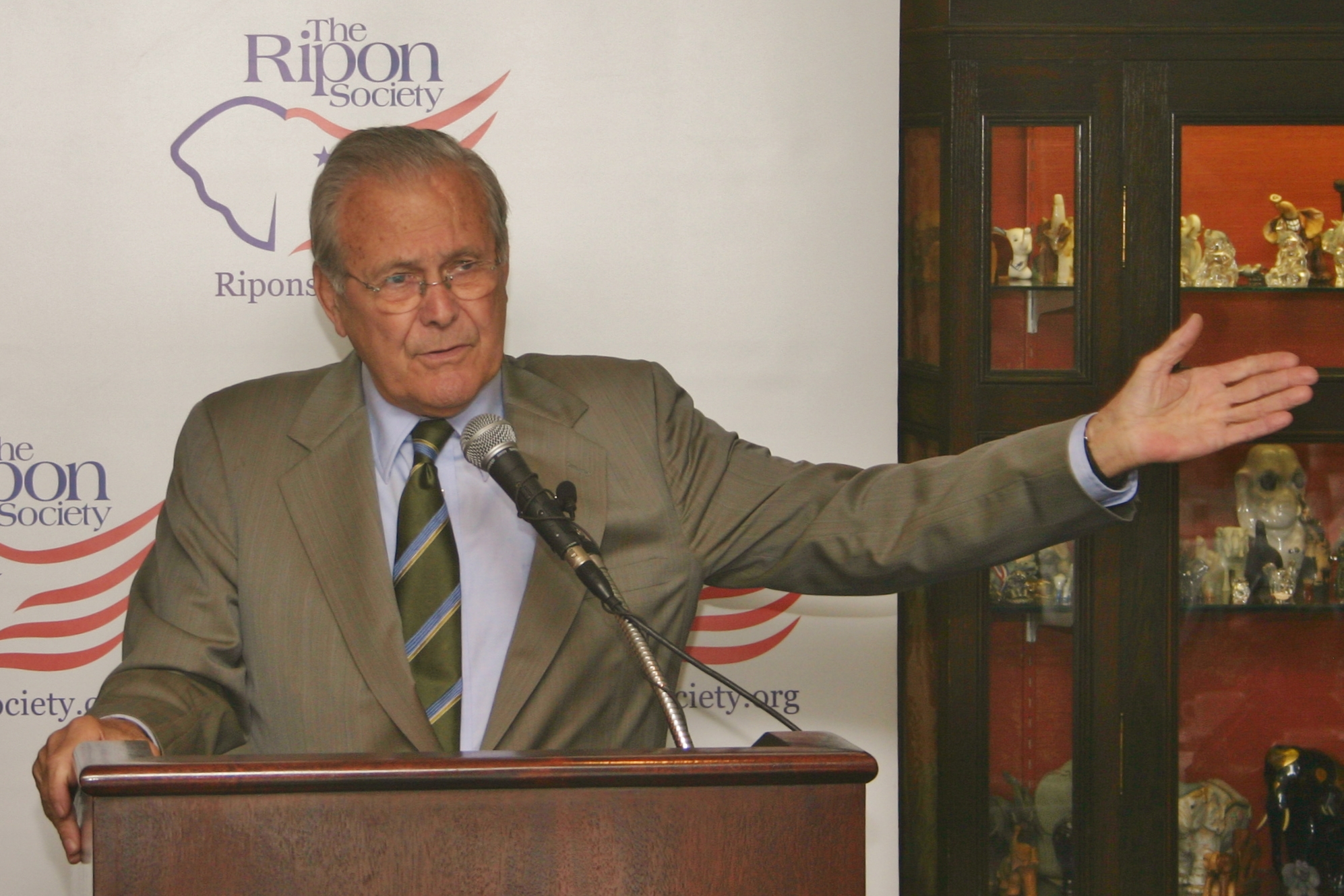 Also comments on potential Pentagon budget cuts, President’s handling of foreign policy, and whether he was surprised Osama bin Laden was found hiding in Pakistan
Also comments on potential Pentagon budget cuts, President’s handling of foreign policy, and whether he was surprised Osama bin Laden was found hiding in Pakistan
WASHINGTON, D.C. – In a speech this morning to The Ripon Society, former Defense Secretary Donald Rumsfeld called for a sweeping reorganization of the federal bureaucracy, saying that “our government is still basically functioning in the structure that dates back to the Truman Administration.” The veteran businessman, congressman, and cabinet official also commented on other issues, including potential budget cuts at the Pentagon, the President’s handling of foreign policy, and whether he was surprised Osama bin Laden was found hiding in Pakistan.
“The institutions that we live with today,” Rumsfeld stated, “almost all were fashioned during the Truman Administration. There was the inflection point at the end of World War II and the beginning of the Cold War where we saw in the United States the National Security Act, the National Security Council, the CIA, the Department of Defense, and the USIA. Internationally, we saw the United Nations created, NATO, the IMF, the World Bank, and the OAS. All of these things are now 60 some odd years old. Some have been adapted and adjusted somewhat. But most of them haven’t changed much.”
An exception, Rumsfeld noted, was the Defense Department, which underwent the Goldwater-Nichols review in the mid-1980s, a reorganization brought upon by legislation passed by Congress, that, among other things, reorganized the military and streamlined the Pentagon’s command structure. By contrast, the former Defense Secretary stated, the federal government has not had a Goldwater-Nichols-type of review, where “the departments and agencies get rearranged” to meet the needs of modern times. “Clearly,” he continued, “at the end of the Cold War, we were at another inflection point going into the 21st century and the information age. Our government is still basically functioning in the structure that dates back to the Truman Administration.
“Take just the National Security Council today. It has a terribly difficult job. You have the Congress, with committees and subcommittees that have become very turf conscious. Seniority makes them important, and they then have budgets. They have control over things, and they want to maintain control over things. As a result, it’s very difficult for the Executive Branch. When problems come up, the goal would be to have those threads go through a needle head in kind of a reasonably coherent way as they move toward the President so decisions can be made. But in fact, what happens is subcommittees basically and committees to some extent in the Congress restrict the flexibility of the Executive Branch to have these issues bend toward the President. The task of the National Security Council as a result is very difficult.
“I think this is an important subject. I don’t find it is terribly interesting for people. I suggest that it ought to be, and that we would be able to function a great deal better if we addressed some of these issues and gave some thought to them and maybe had something like a Goldwater-Nichols for the entire U.S. government.” Rumsfeld added that he thought a similar review should be done for international institutions as well, although he noted that “having served at NATO, I can say that getting changes in an organization that requires consensus – particularly when the French are in it – is very difficult.” Asked about recent attempts by Congress to reorganize specific parts of the federal government, Rumsfeld was blunt: “I don’t think there’s any way to do it piecemeal. The Director of National Intelligence legislation and the Homeland Security legislation are not the kind of models you want to follow in terms of government reform.”

In addition to his thoughts on reforming the federal government, Rumsfeld offered his thoughts on a number of other issues as well, including:
The retirement of Bob Gates and the potential for budget cuts in the Defense Department – “I think Bob Gates has done generally a good job. He’s a thoughtful man. The unions got a hold of him and tore up the National Security Personnel system which we put in place, which is unfortunate. But that’s not his fault. That’s just reality. For the most part, he’s continued the kind of transforming steps that we put in place in terms of strengthening the Special Operations Forces and rebalancing our forces around the world. I don’t know what he’s thinking about with respect to the budget. My impression is he was wise in trying to stake out some ground that might be done to improve the funding for the Department of Defense ahead of allowing Congress and the Office of Management and Budget to get in there. But my guess is they’re both going to get in there anyway. But he’s very sensitive – wisely – to the mistake we’ve made repeatedly [of slashing the defense budget.] It is, in my view, and he’s basically been saying this, that you’re not going to balance the budget — you’re not going to deal with the problem of the debt — off the Defense Department. It’s in the entitlements. When I came to this town in the late 1950s, we were spending about 10% of GDP on defense. Today, it’s about 3.8%. So that is not the problem in my view. Now, is there waste at the Pentagon? You bet, and it’s harder than the dickens to get at. But every year, I think it was about $10 billion the Congress stuffed down our throats that we didn’t want that had nothing to do with national defense. That’s not a bad place to start.”
President Obama’s handling of foreign policy – “I’m uncomfortable with this idea of leading from behind. I think that means that somebody else is leading, and I don’t know who you want doing it besides the United States. You look around the world, there are not a lot of candidates. The person who leads takes risks. The person who takes the risks is subject to criticism. If your goal is to avoid criticism and avoid risk, that creates a vacuum, and that vacuum gets filled by somebody besides you. As you look around the world, I don’t know which continent offers multiple candidates that are going to do a better job than the United States is likely to do. But that means you have to take the risks. Here we are almost a decade after 9/11 and we have not had a successful attack on the United States. I would submit that the reason is because we moved from a defensive posture where we would indict a terrorist in New York in absentia to a forward-looking one where you put pressure on terrorists around the world and make what they’re doing harder. Harder to talk on the phone. Harder to raise money. Harder to recruit. Harder to do everything. The structures that President Bush’s Administration put in place – whether it’s Guantanamo or the military commissions or indefinite detentions or the Patriot Act – those things contributed significantly to protecting the American people. I give the Obama Administration credit for having campaigned against all of them. But two and a half years into their administration, they’ve kept all of them. You get in there, and it’s different than running for office. Suddenly, you realize you’re governing. It’s not fun. I mean, nobody wants to be a jailer for people. No one wants to do those things. But if you’re realistic, they have contributed, and I give them credit for that.”
On whether he was surprised that Osama bin Laden was found hiding in Pakistan – “No, I wasn’t even slightly surprised. If you drive up the Potomac River on the Virginia side, a mile or two away from the Pentagon, and look at these great big estates up there with the big fences and gates, we don’t have any idea what’s going on in them. Nothing! The idea that simply because it’s close to a military base in Pakistan, therefore they had to know – I don’t think so. I mean, if I was OBL, I certainly wouldn’t have told any Pakistanis where I was. He had a billion dollars. He had a very loyal cadre of people. My guess is he had one or two people who knew where he was and that’s it. They were the linkage with the outside. I worry about all this huffing and puffing we’ve seen about Pakistan. Who in the world wants to see a failed state in Pakistan? A large Muslim country with nuclear weapons that is giving us overflight rights and gives us transit rights into Afghanistan. Are they like us? No. Are there people who deal with the Taliban? Sure. Is it conceivable that someone in the Pakistani government knew that his compound was there? Yes, it’s conceivable, and we should ask the tough questions. But I don’t think it’s self-evident that they knew. And I think we all ought to take a deep breath and not rush to judgment.”
The Ripon Society is a public policy organization that was founded in 1962 and takes its name from the town where the Republican Party was born in 1854 – Ripon, Wisconsin. One of the main goals of The Ripon Society is to promote the ideas and principles that have made America great and contributed to the GOP’s success. These ideas include keeping our nation secure, keeping taxes low and having a federal government that is smaller, smarter and more accountable to the people.



